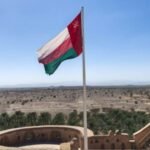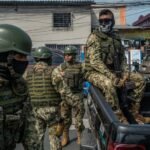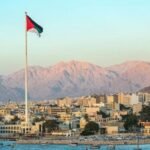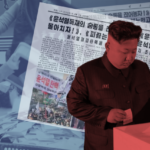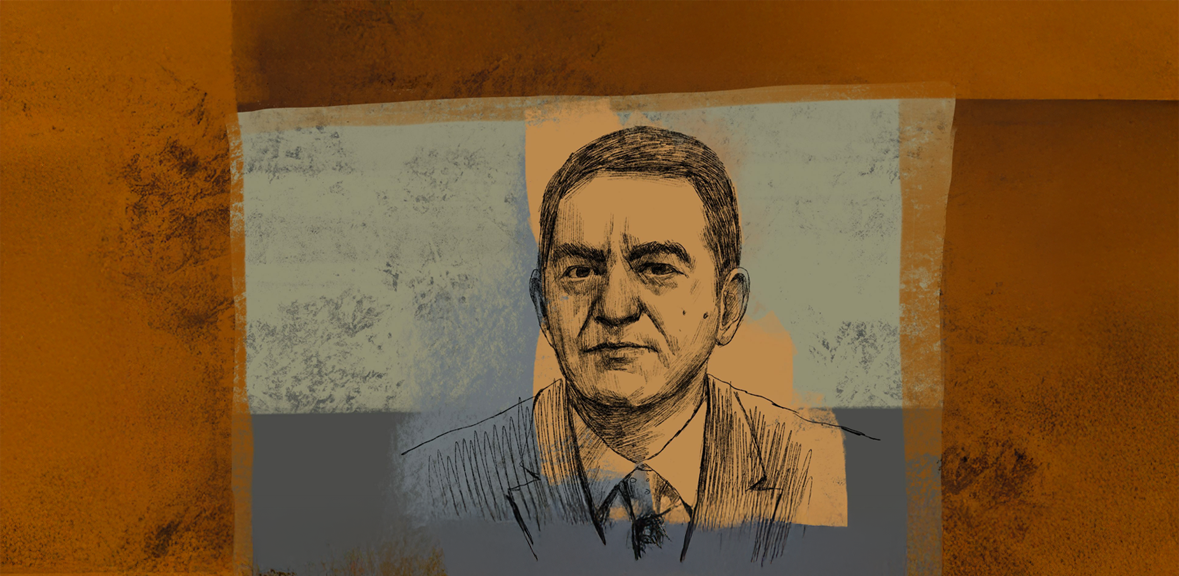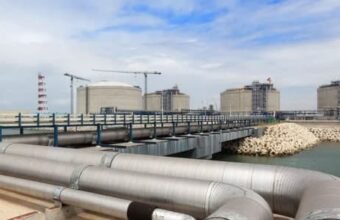How the operations of a gold mining company in Georgia are devastating the lives of ethnic Azerbaijanis
Table Of Content
- According to official data…
- “We decided something must be done”
- “The company agreed to all the demands of the local population”
- “Every fruit and vegetable in the markets of Bolnisi, Marneuli, and Tbilisi contains harmful chemicals”
- RMG does not fulfill the terms of the memorandum
- “And the struggle began”
In the Bolnisi district of Georgia, where ethnic Azerbaijanis predominantly live, gold, silver, and copper have been mined since the Soviet era. This process continued even after Georgia gained independence. As mining operations grew, the mining zones extended into the villages. These operations provoked public unrest. Since 2022, protests have been held in several villages in the district.
The gold mining works are carried out by the well-known regional company RMG (Rich Metals Group), owned by Russian investors. The company is located in the village of Kazreti in the Bolnisi district.
According to official data…
The Sakdris gold deposit is being mined near Kazreti. Some archaeologists believe that the Sakdris mine is the oldest gold mine in the world.
In 2006, the mine was granted protection under the Law on Cultural Heritage, but in 2013, the Georgian Ministry of Culture revoked this status, claiming that the mine had been added to the cultural heritage list in violation of procedures.

This decision, which locals believe was made to benefit the RMG Gold company in its quest for permission to mine gold through open-pit extraction, sparked protests from cultural heritage advocates and others.
The problem lies in the fact that the village’s land irrigation relies on the Kazreti Canal, a 31-kilometer-long waterway that begins at the confluence of the Mashavera and Kazreti rivers.
Official reports from independent German research organizations, along with the Georgian Environmental Research Agency, indicate that the waters of the Mashavera River and the Kazreti Canal are polluted with harmful metals from mining operations run by foreign investors.
A brief overview of the company
Since 2012, the Rich Metals Group companies—RMG Gold, RMG Copper, RMG Auramine, and Caucasus Mining Group—have been operating in the mining sector in Georgia, primarily in the Bolnisi, Dmanisi, and Tetritskaro regions. The company continued its operations, upgrading the facilities that were left over from the Soviet era.
RMG obtained licenses to explore and extract metal ores in Kvemo Kartli, as well as for the existing mining operations at "Madneuli" and "Kavartsit." The company currently employs over 4,200 people.
“We decided something must be done”
When drilling started near villages with a significant ethnic Azerbaijani population in the Bolnisi district, regional activists joined the local residents’ protests.
In 2022, amid growing tensions between RMG representatives and the residents of Mushevani village in the Bolnisi district, activists visited the village to assess the situation.
One of them was Rabil Ismail, the co-founder of the “Salam” platform.

According to Rabil Ismail, the village of Mushevani is one of many that receives no attention from either the municipality or the central government:
“Our environmental work, personally mine, as well as the platform ‘Salam’ which I represent, started here, in this village, in 2022. The local youth reached out to us for help with the problem they were facing. We met with them and decided something must be done about this.”
According to expert Nino Gudzharaidze, a representative of the “Green Alternative” organization, the risk to villages in gold mining areas is very high, and the government should carry out regular monitoring in the region:
“Even with the use of the latest and most advanced technologies, gold mining and processing always have a major, often negative, impact on the environment, people, and local communities. When talking about the mining industry in Georgia, it must be taken into account that this enterprise began its activities during the Soviet era and has always been a subject of special relationships. Back in the Soviet times, the owner had the power to do anything they wanted. Since the Soviet era, the company has consistently drawn the attention of various groups with influence in the higher ranks of power. And the company has always been resistant to external scrutiny. The environmental impact of this industry has always been massive. If we focus on the villages where gold is being mined today, the consequences could be severe, particularly in terms of health effects and the contamination of agricultural land.”

“The company agreed to all the demands of the local population”
“In early August, we reached out to the local community and collected signatures for a petition expressing that the residents did not want the company to carry out any activities near the village.
The first pit is located approximately 800–900 meters from the settlement. This means that the next excavation would be conducted precisely there. For over six months, we fought, and in that time, we succeeded in getting both national media and international organizations to highlight the issue”, continues Rabil Ismail.
The activist stated that over the course of these six months, all state agencies and local government bodies worked to create division among the villagers.
In the end, the majority of the population felt it was futile to continue opposing the company and backed down.
“But even in this case, they made demands which the company accepted,” says Rabil. “This company plans to extract about 5 tons of gold, 7 tons of silver, and about 14 tons of copper here. It will receive huge profits. That’s why they accepted all the conditions of the local population. A new initiative group was formed, which was recognized by the local population. These people are now constantly conducting monitoring. They negotiate with the company. They strive to always prioritize the interests of the villagers.”
After 6 months of conflict between the company and the village, a memorandum was signed.
The company allocated 1 million lari for the development of the village. After the memorandum was signed between RMG and the local community, the amount increased four times, and the initiative group, which included local residents, was able to engage more actively in the company’s operations in the village.
“Our local initiative group has the ability to influence decisions regarding tree cutting, halting excavations, and determining the endpoint of the six-year project.” says Rabil.
“Every fruit and vegetable in the markets of Bolnisi, Marneuli, and Tbilisi contains harmful chemicals”
However, the problem extends beyond the village of Mushevani. According to civil activist Rabil Ismail, RMG’s license, valid until 2045, covers a very large area of the Bolnisi district. This list also includes the villages of Poladauri, Samtsverisi, Zemo Bolnisi, and Kvemo Bolnisi.
“Mining sites are now visible in the mountains near the villages of Samtsverisi and Zemo Bolnisi. Waste is being dumped there. Also, in 2021, it was found that the color of the river in Poladauri changed. It became yellowish green. This means that RMG has laid waste disposal lines throughout the ecosystem. For instance, when they dispose of waste near villages, the toxic chemicals eventually make their way into the river. Why did they choose to do this near the village of Poladauri? Because it is the most isolated settlement, with only a forest beyond it.
From there, the waste travels down the river to other villages. Given that the residents of these villages are primarily engaged in agriculture and livestock farming, it can be said that every fruit and vegetable in the markets of Bolnisi, Marneuli, and Tbilisi is contaminated with harmful chemicals.”
Between 2005 and 2011, the University of Gießen in Germany partnered with the Georgian Institute of Agriculture to conduct joint research. Expert Nino Gudzharaidze explains:
“The results were quite alarming, and it was stated that the consequences reached such a scale that it was necessary to consider closing the region and relocating people. Since the heavy metals released during gold mining easily enter the upper layers of the ecosystem and the human food chain, the impact of these metals on human health is no longer a theoretical concern.”
In previous years, studies were also conducted on the impact of waste on women, with research on breast cancer, and the results were quite unpleasant. At that time, it was stated that the impact on the population could be compared to ecocide. But these results were immediately hidden. The research was conducted by a private clinic, which then withdrew its findings. However, this opinion had previously been published in the press.”
RMG does not fulfill the terms of the memorandum
In the mountains of Kepanachi, one of the largest villages in Georgia with a population of about 5,000 people, silver and gold deposits have also been discovered. Research has been ongoing for many years.
This implies that excavations will start here in the coming years, according to Kenan Mamedov, a resident of the village.
Kenan, who actively participated in the protests in Mushevani and was a member of the initiative group formed after the protests, claims that under the current circumstances, RMG is secretly trying to expand its operations and is attempting to violate the terms of the memorandum.
Furthermore, although RMG continues drilling near Mushevani, they are neglecting environmental restoration. This is another problem that worries the locals. Despite repeated appeals to the company, no actions have been taken on their part.
“Two years ago, a memorandum was signed between RMG and the village residents. The first article of the memorandum stated that RMG would not exceed the 11 hectares specified in the project, neither for exploration nor for mining. Now we believe this article has been violated,” says Kenan. “We found that geological surveys, including drilling, were being carried out in several locations towards the village of Mushevani. The consequences of this could be very bad. This means the pit is expanding, not remaining within the 11 hectares. Of course, if the pit expands, it will cause great harm to the village and the people living here.
We want to believe that RMG will not exceed the 11 hectares, but the fact that RMG is currently conducting research beyond the 11 hectares shows that they will not stop.”
Nino Gudzharaidze says that the risk is very high, especially for the villages located in the new gold mining areas.
She emphasizes that the problem concerns not only the pollution of the soil, water, and air.
“In the village of Geta, a conflict broke out over the attempt to build a waste disposal facility. They tried to convince the people that the construction of the facility was safe for them. But for those who lived nearby, there was no need to explain what it was—they already knew it very well. That’s why the conflict escalated to the point where RMG eventually gave up on building a new waste disposal facility and started rebuilding the old ones, but it can be assumed that they haven’t fully abandoned the idea yet.”
“And the struggle began”
In 2023, tensions arose between the residents of the village of Geta – another village in the Bolnisi district – and representatives of the company RMG. The cause of this tension was a reservoir that the company wanted to build for the purpose of washing off waste in areas used by the villagers.
As a result of several days of protests, RMG officially abandoned this project. A resident of the village of Geta, Nasir Namazov, was among those who opposed RMG’s desire to build a reservoir near the village. He actively participated in the protests in the village.

“The cause of people’s discontent was the excavations in the forest where the local livestock grazed. In the spring, people came here to ride horses and take walks. The main problem arose precisely here. Then, seeing these excavations, we went and stopped the machinery working there. After that, we contacted the Salam platform. And the struggle began.
The protest lasted for several weeks. We went to the municipality and held a protest there. We went to the site of the excavations and held protests there. Almost the entire population of the village participated. As a result, we stopped the work. We won against RMG. So far, everything is quiet, but we still don’t trust RMG; they might take some action at any moment. The reservoir that RMG wants to build would destroy an area of more than 90 hectares. As a community, we resisted. RMG has officially abandoned the project for now.
We fought for what rightfully belongs to us. We have no other village, no other home, no other source of income. But they had alternative places where they could build the reservoir. They had several options.”
According to a study by Transparency Georgia conducted in 2015, 96.21% of RMG Gold’s shares belong to the Netherlands-registered company Rich Metals Group, while the remaining shares are owned by RMG Copper JSC.
The CEO of RMG Gold is Russian citizen Sergey Yganov, and the supervisory board includes three members: Sergey Yganov, Alvidas Brusokas, and Vakhtang Faresishvili. Currently, the company’s official website lists Johnny Shubitidze as the executive director. Similarly, the company GPM (GeoProMining), which operates in Armenia, is also owned by Russian businessmen.
This is the reason why, on February 23, 2023, the U.S. Department of the Treasury placed GeoProMining on its sanctions list.
With the support of the Russian Language News Exchange.
The post “The impact on the population can be compared to ecocide” appeared first on MEYDAN.TV.



